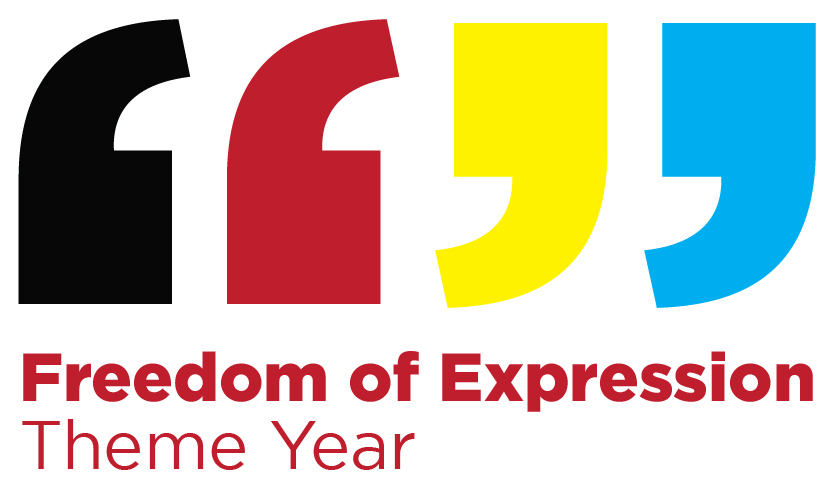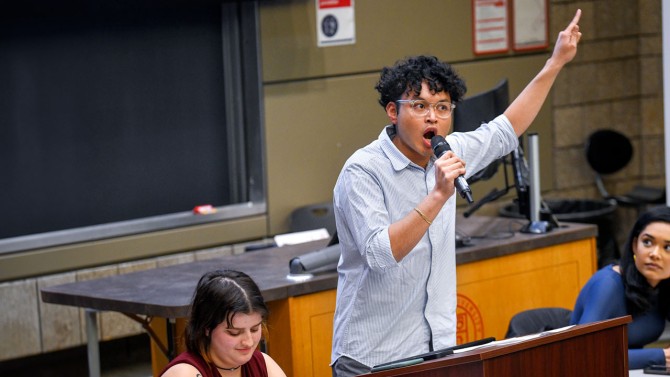
Abigel Manaye ’24 (standing) argues the opposition side of the debate, “Speechless: Should Union Organizers Have Free Speech Rights in the Workplace?,” held Jan. 31 in Ives Hall.
Students debate free speech in the workplace
By Julie Greco
The problem with freedom of expression is that often those who have the most access to it – people with power – are those who need it least.
That was the concluding argument of 24 minutes of animated exchanges in the student debate “Speechless: Should Union Organizers Have Free Speech Rights in the Workplace?” held Jan. 31 in Ives Hall. The debate was the first of three being held by the Cornell Speech and Debate Program supporting Cornell’s Freedom of Expression theme year.
In support of giving union organizers free speech rights in the workplace, ILR School students Amalia Schneider ’24 and Margot Treadwell ’24 asked, “Which world do you want to live in? Which one do you want to work for?” In a vote after the debate, the majority of the audience said they agreed with that team’s stance.
In opposition, Ram Orfanel ’25 and Abigel Manaye ’24, both in the College of Arts and Sciences, argued that freedom of speech in the workplace could create a hostile environment that will inevitably hurt business. The spectators voted them winners of the debate for making the best argument.
The debates are a collaboration among the ILR School’s Office of Engaged and Experiential Programs, the David M. Einhorn Center for Community Engagement and the Cornell SC Johnson College of Business.
“Dialogue between contrasting perspectives is really at the heart of what we do at ILR,” said Alexander J. Colvin, Ph.D. ’99, ILR’s Kenneth F. Kahn ’69 Dean and the Martin F. Scheinman ’75, M.S. ’76, Professor of Conflict Resolution, in his opening remarks. “Productive relations in the labor relations field depend on understanding the perspectives and interests of both parties and reaching agreements that respect and reconcile those interests.”
Schneider, leader of Cornell’s Spanish language debate team, opened the event with a five-minute speech arguing that freedom of speech is a human right that should not end when one enters the workplace. Moreover, she said, freedom of speech in the workplace would allow more union organizing, resulting in more unionizing on a local level, which allows conflicts in the workplace to be resolved on site.
“Your employer controls a lot of your life,” Schneider said. “They control how much you get paid, when you have to show up, when you leave, what you wear and how you act. … We need to do everything that is possible to give workers the power in order to organize and fight back.”
In opposition, Orfanel asserted that freedom of speech in the workplace will result not in collaboration, as the pro side argued, but in conflict “because people inherently have different interests.” Those conflicts will hurt businesses, he said, resulting in lower profits and, eventually, the loss of jobs.
Orfanel further argued that even if freedom of speech were protected, corporations could make up an excuse to fire a worker and find legal loopholes that prevent them from being held accountable.
“You claim to help workers,” he said. “You tell them you have the right to free speech … but what truly happens at the end of the day is the corporations can just fire them, and they end up jobless.”
The next five minutes returned to the pro side. “All the harms that the opposition presented are harms that are already happening,” Treadwell said. “Increasing worker protections does not mean that those harms get worse. It means that they get better.”
The final five minutes were allotted to Manaye, who said unfettered freedom of speech in the workplace will result in increased political and religious speech, creating a hostile environment.
“It doesn’t help the workers to have to sit through a hostile environment and listen to things they don’t want to hear,” Manaye said. “It takes away from their productivity, and it makes them fearful of the employees they have to work with, in addition to their employers.”
To conclude the debate, both sides were allowed a two-minute “whip” speech where the speakers reiterated their main arguments and explained why they believed their side won the debate.
Following the two audience votes, the crowd of more than 200 engaged in a lively conversation over the merits of each argument.
Said Sam Nelson, ILR School senior lecturer and director of the Cornell Speech and Debate Program: “The people who started ILR in 1945 would have been very proud of tonight’s debate.”
Julie Greco is a senior communications specialist at the ILR School.
Media Contact
Adam Allington
Get Cornell news delivered right to your inbox.
Subscribe


